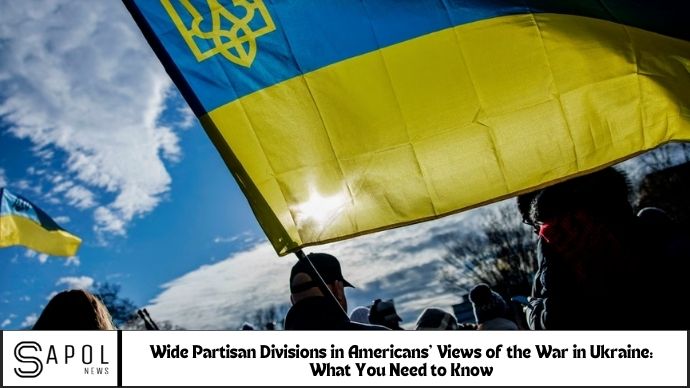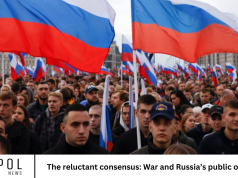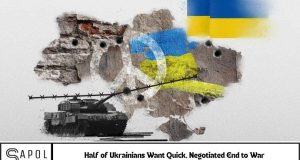Wide partisan divisions remain in Americans’ views of the war in Ukraine Nearly three years into the war in Ukraine, President-elect Donald Trump has vowed to bring the conflict to a swift conclusion upon taking office. While Americans’ opinions on U.S. support for Ukraine have remained relatively stable in recent months, a Pew Research Center survey conducted from November 12-17 reveals significant partisan divides.
Key Findings:
- Republicans are far more likely than Democrats to believe the U.S. is offering too much support to Ukraine (42% vs. 13%).
- Republicans are also less likely than Democrats to agree that the U.S. has a responsibility to help Ukraine defend itself against Russia’s invasion (36% vs. 65%).
Moreover, Republicans have consistently been less likely than Democrats to see Russia’s invasion as a direct threat to U.S. interests. This gap has widened over time, with only 19% of Republicans now viewing the invasion as a major threat, compared to 42% of Democrats.
U.S. Support for Ukraine:
Recent data shows that 27% of Americans believe the U.S. is offering too much support to Ukraine, while 25% think the support is “about right,” and 18% feel the U.S. is not providing enough assistance. These views remain largely consistent with those from July, although Americans are slightly more uncertain now, with 29% unsure compared to 25% in July.
- Among Republicans, 42% believe the U.S. is providing too much support. 19% think the support is adequate, and 10% feel it’s insufficient.
- Among Democrats, only 13% say the U.S. is offering too much aid. 31% think the support level is appropriate, while 28% believe it’s not enough.
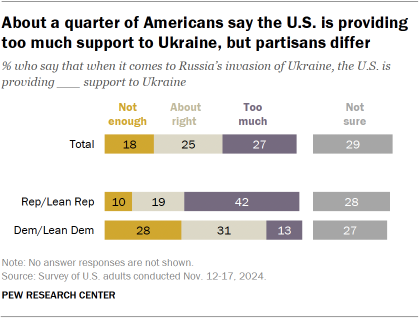
U.S. Responsibility to Help Ukraine:
Americans remain divided over whether the U.S. has a responsibility to help Ukraine defend itself from Russia’s invasion. 50% of Americans agree that the U.S. has this responsibility, while 47% disagree. This split has remained largely unchanged over recent months.
The partisan gap on this issue is also consistent with earlier surveys:
- 36% of Republicans believe the U.S. has a responsibility to help Ukraine, the same percentage as in July.
- 65% of Democrats hold the same view, which is virtually unchanged from 63% in July.
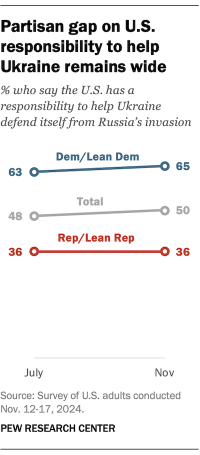
The Current Landscape of Public Opinion
According to a Pew Research Center survey in mid-2023, 65% of Democrats supported sending military aid to Ukraine, compared to just 40% of Republicans. These figures illustrate a stark contrast in how both political groups view the situation, underscoring the role of political identity in shaping foreign policy preferences.
Key Points to Consider:
- Democratic Support: Many Democrats view the war in Ukraine as a moral and democratic imperative, emphasizing the protection of human rights and international order.
- Republican Disagreement: On the other hand, Republicans tend to prioritize concerns about U.S. interests, fiscal responsibility, and skepticism about long-term engagement in Europe.
What Drives the Divisions?
The wide gap in public opinion can be attributed to several factors, including media consumption habits, party rhetoric, and geopolitical ideologies.
Media Influence:
- Democrats often consume news from sources that emphasize Ukraine’s struggle for democracy and independence. These sources frame the war in terms of global security.
- Republicans, however, frequently turn to media outlets that question the efficacy of U.S. aid or emphasize the economic costs involved.
Political Messaging:
- High-profile political figures also play a role in shaping public opinion. Republican leaders like Senator Rand Paul have voiced opposition to significant U.S. aid, which resonates with conservative voters.
- Meanwhile, President Joe Biden and other Democratic leaders continue to advocate for robust support, casting it as a necessary stand against Russian aggression.
The Economic Argument: Is U.S. Aid Justified?
One of the most debated aspects of this issue is whether the financial support to Ukraine is a wise investment for the United States. As of January 2025, the U.S. has committed over $100 billion in military and humanitarian aid to Ukraine.
Fiscal Concerns:
- Many Republicans argue that the cost of supporting Ukraine is unsustainable, especially amid concerns about domestic economic challenges such as inflation and national debt.
- Democrats, in contrast, argue that the cost of not intervening could be even greater, leading to instability in Europe and a loss of global influence for the U.S.
The Role of National Security
For many Democrats, the war in Ukraine is viewed as a critical element of national security. They argue that supporting Ukraine is necessary to deter further Russian aggression and maintain global stability.
Conversely, Republicans tend to see the conflict as a European issue that does not directly affect U.S. security interests. This divergence in perspectives significantly shapes the debate on the effectiveness and necessity of continued U.S. involvement.
The Political Implications
As the 2024 elections approach, partisan divisions over Ukraine are likely to intensify. Politicians on both sides will continue to shape their foreign policy platforms based on public opinion within their respective parties. This has the potential to influence the future of U.S. support for Ukraine, and ultimately, the international response to the ongoing crisis.
May you also like it:
War Speeches, ATACMS & Abrams for Ukraine, and Russia’s Diplomatic Moves
US Opinion Leaders Support Continued Aid to Ukraine
War Speeches: Diplomatic and Political Implications of Russia’s War Against Ukraine in October
FAQ
1. Why are Americans divided over the war in Ukraine?
Americans are divided due to different priorities, with Democrats focusing on democratic values and international security, while Republicans are more concerned about fiscal responsibility and national interests.
2. How do Republicans and Democrats differ in their views on U.S. involvement in Ukraine?
Democrats generally support continued U.S. aid to Ukraine, while Republicans are more skeptical about the costs and long-term implications of such involvement.
3. What role does the media play in shaping opinions about the war in Ukraine?
The media has a significant influence, with Democrats often consuming news that frames the war as a global security issue, while Republicans focus on the economic impact of U.S. aid.
4. How much money has the U.S. committed to Ukraine?
As of January 2025, the U.S. has committed over $100 billion in military and humanitarian aid to Ukraine.
5. Is U.S. involvement in Ukraine justified from a national security perspective?
Democrats argue that it is vital to prevent further Russian aggression, while Republicans believe the U.S. should focus on domestic issues and avoid prolonged involvement in European conflicts.
6. How might the war in Ukraine affect the 2024 U.S. elections?
The partisan divide over Ukraine will likely play a significant role in the 2024 election campaigns, with politicians using the issue to appeal to their base.
Conclusion
The wide partisan divisions over the war in Ukraine reflect deeper ideological divides in the U.S. political landscape. With the conflict continuing to shape global geopolitics, these divisions are likely to persist and even intensify in the run-up to the 2024 elections. As such, the future of U.S. foreign policy towards Ukraine remains uncertain, contingent on the shifting dynamics within the American electorate.

